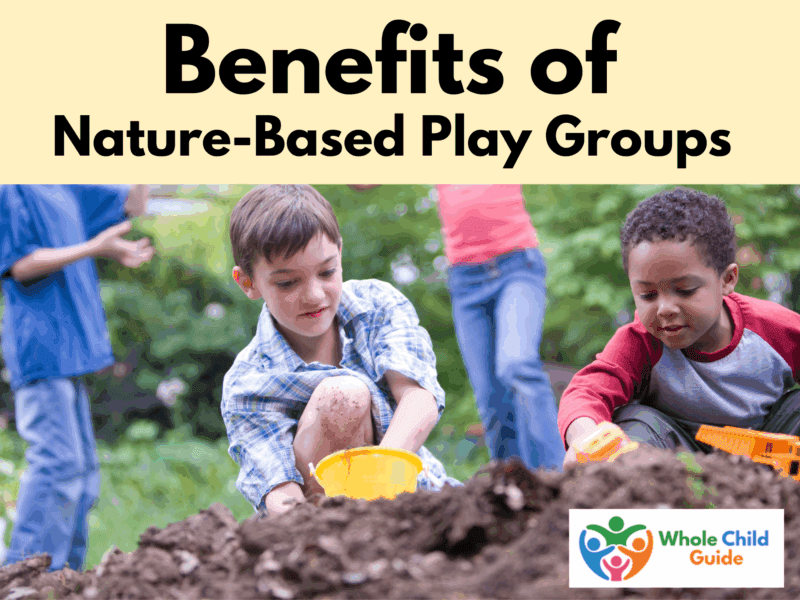
If you’re parenting a preschooler, you probably know that play isn’t just fun, it’s how kids learn, grow, and make sense of the world. And when that play happens outdoors, surrounded by sticks, mud, leaves, and imagination? The developmental impact is even greater. That developmental aspect is why occupational therapy providers and speech therapists use play as a tool in their interventions.
Today, we wanted to cover a resource you may not realize is offered in many communities: nature-based playgroups.
Nature-based playgroups are more than just a way to spend the morning, they’re a research-backed way to support preschoolers’ cognitive, motor, social, and emotional development. And for parents, especially parents of young children, these programs offer something just as meaningful: connection, support, and a reminder that you’re not doing this alone.
In this post, we’ll explore how nature-based playgroups benefit preschoolers, how they strengthen community for caregivers, and how you can use Whole Child Guide to find local nature-based programs near you.
The Benefits of Nature-Based Play for Preschoolers
Preschoolers learn best through movement, exploration, and hands-on experience, and nature provides the perfect setting for all three. Here’s how nature-based play supports child development:
- Gross and Fine Motor Development- Climbing over logs, balancing on rocks, scooping dirt, and collecting leaves help kids build strength, coordination, and body awareness in ways that indoor settings often can’t.
- Sensory Integration- Nature is full of rich, calming sensory input: wind, texture, temperature, and sound. Outdoor play helps children regulate their sensory systems, which supports attention, calm, and emotional regulation.
- Imaginative and Cognitive Growth- Sticks become magic wands. Pinecones turn into cupcakes. In nature, there are no rules for play—only opportunities to create. This kind of open-ended play strengthens creativity, problem-solving, and cognitive flexibility.
- Social and Emotional Skills- Group play in nature invites children to take turns, cooperate, and resolve conflicts in a low-pressure, open space. It also fosters independence, resilience, and self-confidence.
Gross Motor Development
How it’s supported:
Nature provides uneven surfaces, varied terrain, and open-ended movement opportunities that challenge and build large muscle groups, balance, and coordination.
Activities:
- Climbing on rocks or fallen logs
- Jumping over puddles or balancing on tree stumps
- Running or chasing games through grass or wooded areas
- Pulling wagons, dragging branches, or lifting buckets of water
- Rolling down hills or crawling through tunnels made of sticks
Fine Motor Development
How it’s supported:
Outdoor environments offer small tools, natural textures, and tactile materials that build hand strength and coordination.
Activities:
- Collecting and sorting leaves, acorns, or pebbles
- Building fairy houses with twigs and bark
- Using child-safe scissors to cut grass or leaves
- Drawing in dirt or sand with sticks
- Transferring water or mud between cups using scoops, tongs, or fingers
Sensory Integration
How it’s supported:
Nature is inherently multi-sensory. Children experience sounds, textures, temperatures, and movement that support regulation and awareness.
Activities:
- Walking barefoot on grass, sand, or mulch
- Playing with water, mud, or snow
- Listening for birds, wind, and rustling leaves
- Smelling herbs, flowers, or earth
- Swinging in hammocks or on rope swings (vestibular input)
Cognitive Growth
How it’s supported:
Unstructured, open-ended outdoor play encourages problem-solving, decision-making, and creativity. Nature inspires curiosity and exploration.
Activities:
- Creating obstacle courses from natural materials
- Observing insects and drawing what they see
- Building forts or shelters using sticks and tarps
- Nature scavenger hunts that promote memory and categorization
- Asking open-ended questions like “What do you think this is for?” or “How can we build a bridge over this puddle?”
Social & Emotional Skills
How it’s supported:
Outdoor group play gives children the space and freedom to interact naturally, solve conflicts, and build confidence through risk-taking.
Activities:
- Cooperative games or group building challenges
- Role-playing or imaginative storytelling with nature props
- Turn-taking with shared tools (e.g., watering cans or shovels)
- Encouraging expression of emotions through art with natural materials
- Calming down under a tree or in a quiet “nature nook” to self-regulate
Why Nature-based Play Works
Nature-based play is powerful because it’s child-led, movement-rich, and sensory-balanced. Kids are learning through their whole bodies, in a setting that naturally supports regulation, curiosity, connection, and resilience, all without screens or structured worksheets.
The Hidden Benefit: Connection for Moms (and Dads) and Caregivers
While the kids are climbing, digging, and exploring, something equally important is happening on the sidelines: moms are connecting with other moms (parents and parents).
In a time when early motherhood can feel isolating, nature-based playgroups offer something special. There’s no pressure to have a perfect outfit or structured conversation, just open air, shared experience, and the chance to talk to someone who gets it.
- Sharing stories, frustrations, and small wins builds emotional resilience.
- Watching kids thrive in a screen-free, unhurried space brings a sense of peace.
- Being outside and in community supports maternal mental health and mindset.
It’s not just a playgroup, it can be a lifeline for parents and guardians!
How to Find a Nature-Based Playgroup Near You
Nature-based programming is growing in popularity, but it’s still hard to find unless you know where to look. That’s why we created Whole Child Guide, to help families connect with trusted local programs that support the whole child.
Whether you’re looking for a preschool enrichment group, a weekly outdoor meet-up, or a mom-and-me class in the woods, our searchable directory helps you filter by location, child age, and provider background.
Ready to Get Outside and Grow Together?
Nature-based playgroups nurture preschoolers’ development, foster community for parents, and bring a little more calm and connection into busy family life.
Use the Whole Child Guide Services tool to find local nature-based programs in your community, and give your child the gift of play, growth, and connection in the great outdoors.
For more information on setting up a nature-based playgroup program in your area, check out our resource on how to grow your nature-based playgroup business.
